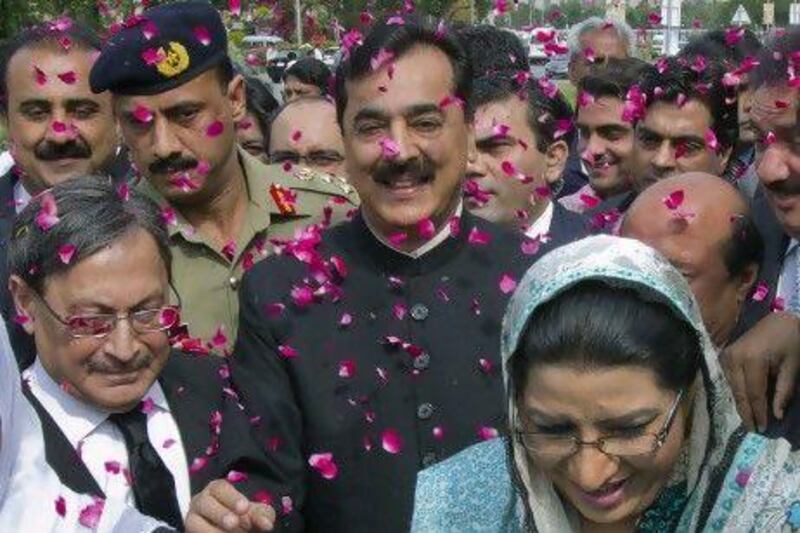ISLAMABAD // Pakistan Prime Minister Yusuf Raza Gilani's conviction on contempt of court charges led the opposition to call for his resignation, potentially igniting another legal and political battle in the country, analysts said.
The "prime minister should immediately resign. He should step down without causing further crisis," the main opposition leader and former prime minister Nawaz Sharif told private television station Geo.
"The court verdict is based on truth and reality ... the prime minister himself is to be blamed," he said.
A seven-judge Supreme Court panel found Mr Gilani guilty of willfully flouting, disregarding and disobeying its orders by not reopening a corruption case against his boss, President Asif Ali Zardari.
Imran Khan, head of the Pakistan Tehreek-i-Insaf (PTI) party, said during a news conference that Mr Gilani had lost "all moral authority, so he should quit office from today".
Syed Munawwar Hassan, chief of country's largest Islamic group, Jamaat-e-Islami, made similar demand.
Although the court panel stopped short of disqualifying Mr Gilani from holding office and gave him a symbolic punishment by detaining him for less than a minute, analysts said the verdict could spark political confrontation between the government and opposition and deepen tensions with the judiciary, which is seen as hostile to Mr Zardari and Mr Gilani.
According to legal experts, the speaker of parliament will have to decide whether Mr Gilani should lose his seat because the judgment cited the constitutional clause that prohibits felons from holding public office.
However, because the speaker, Fahmida Mirza, is a member of Mr Gilani's ruling Pakistan People's Party (PPP), it is unlikely that she would act against him.
"I foresee another crisis in the making," Rasul Bukhsh Rais, a professor at the Lahore University of Management Sciences, said yesterday. "The politics of polarisation will continue."
Angry PPP workers held protest rallies in several cities shortly after the verdict to express support for Mr Gilani.
After the verdict, Mr Gilani chaired an emergency meeting of the cabinet where it was decided that he would appeal the verdict and his aides said he would not step down.
"The prime minister was not convicted in any moral case. He is convicted in a political case," the information minister, Qamar Zaman Kaira, said during a news conference. "This conviction is an honour for him."
"He is still prime minister and he will remain prime minister," said Mohammad Adeel, a leader from Awami National Party, a major coalition partner of the PPP.
The PPP expressed "concern over attempts to dismiss an elected government and an elected Prime Minister," according to a statement from Mr Zardari's office.
The source of the current conflict is a graft case against Mr Zardari that involves kickbacks he and his slain wife, former prime minister Benazir Bhutto, allegedly received from Swiss companies when Bhutto was in power in the 1990s. They were found guilty in absentia in a Swiss court in 2003.
Mr Zardari appealed, but Swiss prosecutors ended up dropping the case in 2008 after the Pakistani government approved a law that gave Mr Zardari and thousands of political activists immunity in corruption cases dating back to the 1990s.
The Pakistani Supreme Court struck down the law as unconstitutional in 2009 and ordered the government to write a letter to Swiss authorities requesting they reopen the case. Mr Gilani has refused, saying the Pakistani constitution grants the president immunity from criminal prosecution while in office.
Pakistan had been ruled by the military for most part of its 65 years. Mr Gilani, who took office in March of 2008, is the longest serving civilian prime minister.
Elections are due next year but analysts say the government may call them later this year to avoid further confrontation.
foreign.desk@thenational.ae
* With additional reporting by the Associated Press





